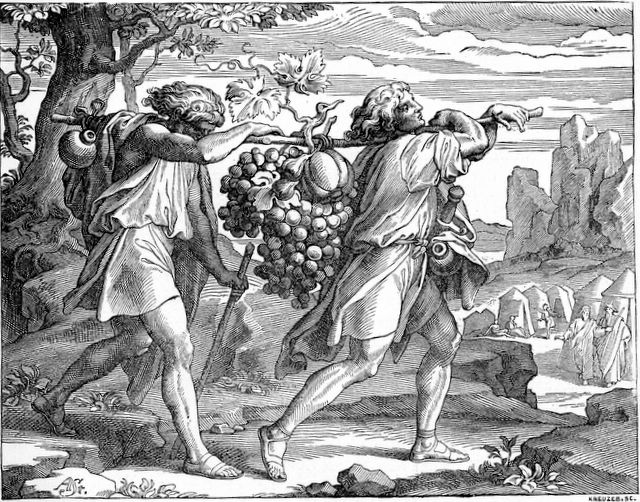In our last Parasha we were introduced to Eldad and Meidad (“אלדד ומידד”) the two prophets who were considered for members of the new Sanhedrin. Eldad and Meidad had a prophecy while HaShem’s Shechinah rested upon them in the camp. They prophesied that Moshe will not be entering the Land of Israel. It is worth mentioning here that Eldad and Meidad were Moshe’s half brothers, according to Targum Yonatan ben Uziel. The Gemara in Sotah says that because of the decree of Pharaoh to throw the male children into the Nile River, Amram divorced his wife Yocheved, and during the period between her two marriages to Amram, Yocheved wanted to continue to have children and so she married Elzaphon ben Parnach and during that brief marriage she gave birth to two sons, Eldad and Meidad. Its worth mentioning here that Yocheved was 130 years old when she gave birth to Moshe (according to Midrash and Aggadah).
Upon such prophecy they approached the tribal’s presidents who were also the “heads” of Bnei-Yisrael with this prophecy. The year is 2449 on the 29th day of the month of Sivan. We learn from the words “send for you” (“שְׁלַח-לְךָ”) two amazing hidden messages in their numerical values. The word “Lecha” (“לְךָ” – for you) in Gematria is 50, alluding to the entire twelve tribes as their total letters combined are fifty letters. The word “send” (“שְׁלַח”) in Gematria is 338, alluding to the year the first Beit-HaMikdash was supposed to be destroyed – 338 years from that moment. Moshe begged HaShem to keep his promise to our three Forefathers, and HaShem postponed the distraction by 3000 years. Talmudic chronologists for the destruction of the First Temple was 423 BCE (3338). A 1000 years postponement for each of our Forefathers. Same as all other disasters that occurred on the same day of Tisha B’Av (ninth of Av), five national Jewish catastrophes. HaShem’s marcy allowed for three thousands year postponement of the destruction of Beit-HaMikdash, instead of 338 years after the sin of the spies.
The words used to describe the actual “sending” of the spies are “שְׁלַח-לְךָ” “Send For You”, meaning HaShem said to Moshe do not send spies on my behalf. What HaShem was really telling Moshe is that He (HaShem) does not need spies to be sent to survey the Promise Land. HaShem knows its greatness and the fulfillment of His covenant with our Forefathers. Since Bnei-Yisrael still doubt HaShem’s promise, they have the freedom to choose such an action of sending spies. The word “send” (“שְׁלַח”) also spells the word “Chalash” (“חלש” – weak), alluding to Bnei-Yisrael being weak in their belief in HaShem as they wanted to send spies. HaShem hinted to Moshe and Bnei-Yisrael that the land of Milk and Honey is really the world to come in days of Mashicah. We learn this from the acronym of the last letters of these words “Zavat Chalav HuDevash “זָבַת חָלָב וּדְבַשׁ”, which spells the word “שבת” Shabbat. Due to their weakness the (the spies) Torah describe the land of Israel as the “land of Ca’naan – אֶרֶץ “כְּנַעַן and not Israel, due to their lack of faith.
The Zohar teaches a beautiful message about the words HaShem used to tell Moshe to pick up one leader from each tribe and to send them to survey the land – “שְׁלַח-לְךָ אֲנָשִׁים, וְיָתֻרוּ אֶת-אֶרֶץ כְּנַעַן” (Verse13:2). The word used here is “Yaturu” (“יָתֻרוּ”) and its numerical value is 616 = The Torah (“התורה”). The land of Israel is connected to the Torah, Zeir Anpin (Lesser Countenance) as HaShem gave us a physical place we can relate to. By the use of the first three letters of this sentence we understand Bnei-Yisrael’s lack of belief in the Torah. The acronym of these words “שְׁלַח-לְךָ אֲנָשִׁים” is “SheLo” meaning that is not, speaking of the next word “יָתֻרוּ” that has the same numerical value as the Torah – 616. Moshe Rabbeinu” in numerical value is 613, alluding to 613 Mitzvot. Also Yaturu” (“יָתֻרוּ”) and its numerical value is 616 as Yitro who got this portion.
Let us try to explain such horrific and catastrophic event in our history within this Parasha and the spies, the heads of Bnei-Yisrael, the presidents of the tribes. This group of leaders was at the highest possible status within Bnei-Yisrael, as they were most influential “heads of state” and the authority of each tribe. What really happened was that Eldad and Meidad had a prophecy of Moshe’s passing prior to entering the Land of Israel. With this profound information they went directly to the presidents and shared this prophecy with them all.
According to Moshe’s teaching, Bnei-Yisrael (including the presidents) knew that upon entering to the Promised Land, the role of leading Bnei-Yisrael will be at the hand of a king and not the presidents. We learn this from the book of Devarim in the portion of Shoftim (judges) 17:14-16 “upon entering the land… set a King over you of my choosing” (“כִּי-תָבֹא אֶל-הָאָרֶץ”… שׂוֹם תָּשִׂים עָלֶיךָ מֶלֶךְ, אֲשֶׁר יִבְחַר יְהוָה אֱלֹהֶיךָ בּוֹ”). Such a shift in power did not “sit” well with the current leaders who were the presidents of Bnei-Yisrael in the desert. Upon hearing the prophecy, the presidents devised an immediate scheme to avoid such shifting of power in the near future, meaning loosing their positions. They decided to take this matter into their hands, and be the ones to go and spy on the future land, essentially dictating the outcome to avoid entry to Israel. In reality if one came to a head of state or to a president and stated that “we are entering a new land”, one might assume that this president will send his secret service to spy and survey the new land, and not himself. From such an action we are to assume that the presidents wanted to control the outcome of such a trip.
Choosing to spy on the Promised Land, the presidents were already planning to control the future by speaking ill about Israel. They didn’t want to lose their high position and they planed to remain in the desert and hold on to their leadership position. HaShem’s words in the first verse “Send them for you…” also mean send them for your own needs and their doubts. The Zohar tells us that Moshe actually wanted to send the spies to see if the “Tree of Life” still existed in Israel, since he was not going to enter the land. In verse 13:20 the Torah writes, “Is there one tree?” (“הֲיֵשׁ-בָּהּ עֵץ”). He was hoping that the “Tree of Life” still exists, so that he and Bnei-Yisrael will not die, and he will be allowed entry to Eretz Israel. Moshe also provided the spies with a scenario of a negative outcome, if the Tree is not there. The Torah writes, “If the “Tree of Life” is not there, be strong” (“אִם-אַיִן, וְהִתְחַזַּקְתֶּם”) and know that in the days of Mashiach the Tree of Life will be there, so do not lose hope. When Moshe sent the spies, he instructed them to bring back “fruit”, and he meant fruit from the Tree of Life, as a proof. As we see in verse 13:20, Moshe asks them to take one fruit alluding to this specific tree and its powerful fruit.
Of topic – It is worth pointing out here that in the movie Avatar (by James Cameron) he hints to the “Tree of Life” with the story of a hybrid human-alien called an Avatar that is created to facilitate communication with the indigenous Na’vis (prophets) from the planet Pandora (Garden of Eden) and our world. The characters in the movie are connected to the “Tree of Life” (with their long hair, just as the Teffilin straps) and we witness the divine colors and co-existence among all creations in the Pandora (Gan Eden) just as it will be in Garden of Eden.
The word Avatar in Hebrew is the “Urim and Tumim” (“אורים ותומים”), the “Breastplate” oracle placed on the Kohen Gadol (the High Priest). When a leader of Bnei-Yisrael needed a specific answer from HaShem, they consulted with this breastplate known as the Urim and Tumim. The Urim and Tumim were used as a divine oracle. The meaning of Urim and Tumim sometime refers to revelation and truth, also dreams and prophets. The Kohen Gadol and Moshe used the Orim and Tumim to get Divine answers to major questions, such as going out to war. It is worth mentioning here that the logo of Yale University has the Urim and Tumim on it (the University founded by a donation from a rich Jew named Elijah Yale.) Their Logo also has in Latin “Lux et Veritas” which translates to “Light and Truth”.
The word “spies” in Hebrew is “Meraglim” (“מרגלים”), which has a secret code in it. We see that the first letter is “Mem” (“מ”) which in Gematria is 40 and the word “Regalim” (“רגלים”) means the three festivals that Bnei-Yisrael were commanded to go up to Jerusalem every year. This alludes to the 40 days of travels and the 40 years Bnei-Yisrael were to be punished for agreeing with the spies and accepting the “Lashon Hara” (“לשון הרע”) they spoke of the Promised Land. We must learn from such a collective punishment a profound lesson. We, Bnei-Yisrael, must always trust HaShem and should not let few human “spies” tell us otherwise. We must stand for HaShem and never fear or place our trust in man, just as Moshe said to Bnei-Yisrael.
In the second verse of (13:2) there is a beautiful teaching, as the Torah writes “Ish Echad, Ish Echad” (“אִישׁ אֶחָד אִישׁ אֶחָד “ – one man, one man). This naming alludes to Joshua and Calev as they were very discreet about their mission. Pirkai Avot teaches us that “In a place were no man to be found… be that man”, meaning lead with HaShem at your heart when no true “man” who believes in HaShem is to be found. Hillel taught us: “A person who is [too] shy [to ask questions] will never learn, and a teacher who is too strict cannot teach . . . and in a place where there are no men, strive to be a man” (2:5).
Even though HaShem didn’t really want the spies to go (on His behalf) and “tour” the Promised Land, He still gave Moshe His permission. The Torah writes each name of these spies and many of the spies have names that allude to their specific character traits and distinguishing qualities. For example, the name “Sodi” means my secret, “Stur” means hidden, etc. We notice that Moshe changed the name of Hoshea (“הושע”) to Yehoshua (“יהושע” – Joshua), adding the letter “Yod” to his name (the letter “Yod” came from Sarah as her original name was “Sarai”. HaShem replaced the letter “Yud” (“י“) with the letter “Hay” (“ה“) and her name became Sarah (“שרה”). After Avraham circumcised himself HaShem blessed him and changed his name as well, from Avram to Avraham (“אברהם”) by adding the letter “H” (“ה“) to his name, as from HaShem. The numerical value of the letter “Yod” is 10, which is twice the letter “Hay” its numerical value is 5. HaShem took the letter “Yud” from Sarai and divided it into two. The letter “Yud” was given to YeHoshua prior to Moshe’s passing and his entrance to Israel.)
By adding the letter “Yod” we learn that Moshe placed HaShem’s name in YeHoshua, and he also assured that he will rise up above the other ten spies who spoke ill of Israel. For his true faith in HaShem and Moshe Yehoshua was rewarded with the honorable task of leading Bnei-Yisrael into the Promised Land, as it is written in the Torah.


























